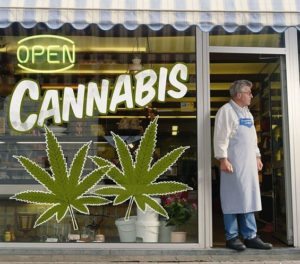The State borders, not the national ones.
Everyone knows the mantra for success in real estate: “location, location, location.” The entrepreneurs in the emerging cannabis industry have certainly figured that out. They’ve been busy opening stores in small towns that border on neighboring states where cannabis isn’t yet legal. And encouraging the residents of those states to stream across the state line, in hot pursuit of pot products.
And so they have. In considerable numbers, cash in fist.
First was the Oregon town where cannabis businesses were set up with the intent of attracting customers from conservative Idaho and other Mountain states. Now the same thing has happened to Sunland Park, NM, a town of 17,000 just steps from the Texas state line. It’s a short trip for residents of fast-growing metropolitan El Paso and environs.
Once again, they appear to be taking full advantage.
Texans two-step across border to fill Sunland Park’s cannabis dispensaries
One thing Texas and Idaho have in common: both are controlled by Legislatures that are unlikely to legalize recreational marijuana anytime soon. Said one entrepreneur: “in other words, they’re ripe for plucking.”
That was why cannabis companies targeted rural areas that, on the surface, seemed far too small to support their business. They wouldn’t have to, as their next door neighbors would provide all the customers required. Leaving the border towns themselves free to sit back and collect taxes.
The whole thing reminded me of the period some years ago when casino gambling was plentiful in Delaware and West Virginia, but prohibited in affluent Maryland. As predicted, Marylanders picked up the slack, driving to Dover and Charlestown to sacrifice their money to the slots and at the tables.
All along, however, everyone knew the day would come when Maryland, envious of the revenue it was losing to other states, would authorize casino gambling. That’s exactly what happened.
Texas and Idaho may take longer. Still, most observers think they, too, will eventually come around. Texas already has a wide open market for D8, a close relative of Delta 9 THC that somehow slipped in under cover of a massive piece of agricultural legislation. As a result, a host of products containing D8 can be purchased now, legally, in any number of mini marts and convenience stores around Texas.
I’m sure the big players in recreational pot are anticipating this, too, and have contingency plans in place.
Meanwhile, in the small city where I live, yet another cannabis dispensary has opened its doors. That makes a total of 43. Way, way more than needed to satisfy the pot preferences of 85,000 residents.
Of course, the new entries are hoping for a cut of the tourist trade. Who can blame them? Our tourists visit for the art and the food and the history, but why not help them get high while they’re here?
I’m guessing that many, perhaps most of the new pot businesses will gone in another couple of years.












